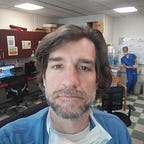What Drives Doctors During a Pandemic? Turns Out, It’s Not Primarily Helping Sick People
I’m a doctor, and right now I work in a hospital that only admits COVID-19 patients.
I surprised myself recently. I was supposed to be off for a week, but I texted my boss and asked if I could come in.
People have two reactions to this. First, they think I’m literally insane. There’s a raging pandemic that could kill you, and you volunteer to get more exposed? Dude, just sit on your couch and watch some Netflix! If not, you must actually have a death wish.
The second reaction is a swoon of gratitude. Oh, you doctors are so generous, so selfless! You care so much about healing and health. Altruism flows through your veins and generosity is woven into the fibers of your muscle tissue!
But this doesn’t add up. Neither of those captures me as a person. I’ve never been the “run toward the fire” type, and I’m definitely not the “raise your hand if you want extra work” type.
So what’s really going on inside a doctor or nurse who has the urge to spend extra time at the center of the pandemic?
When I got to the hospital that week, I saw my colleague Ankar, who had also volunteered during his week off. And Ankar and I are not alone. This the past month I’ve come across seven different doctors who did the same thing.
I spoke with them about where this urge comes from, and I’ve been learning a lot about what drives healthcare workers in moments like this.
When I asked Ankar if he was doing it out a sense of altruism, and he laughed out loud.
“I just want to be sure things get done right,” he said. “They have an ophthalmologist taking over my service. It drives me crazy thinking that my treatment plans will be screwed up.”
One healthcare worker told me he came in to work just for the human interaction. If you’re a doctor in a time of quarantine, you have a choice between risking your health and being alone for 7 days. The true extrovert might just choose a slightly increased health risk.
Another person told me she had a sense of FOMO when she was at home. All she could do was remember the life of the hospital: the hum and buzz at the nurses station; the chattering, nervous jokes as people gown up to go into a room; the tense squabbling about whether an order was placed properly.
Maybe working in a hospital is like being in a relationship: the things that annoy us most become our fondest memories later.
What was my personal motivation? Like the others, my first thought wasn’t the sick patients. I remember thinking a lot about my colleagues, about how much work there was to be done, and how much easier it would be if we all pitched in.
Selfishly, I hoped they would return the favor and come help me during their time off.
For some doctors it’s just a desire to be close to the action. To be in the room where it happened. One physician described his feelings from a world historical perspective. This moment in time will never come again, he said. It will be written about in the history books. When your grandkids ask about it, do you really want to reply that you sat it out at home?
Consider firefighters. Certainly, they have a commitment to controlling fires, and an intellectual appreciation of the damage fires can do.
But at least for some firefighters, there’s also a desire to be a hero.
And there’s nothing wrong with that. Plenty of worse things to do with your life than be a hero.
The same applies to doctors and nurses during this pandemic (which yes, does feel a lot like a house on fire). Of the seven colleagues I spoke with about their motivations, none mentioned sick people. After I prompted them, several said “Well yeah, of course, obviously.” But it’s not what came to their minds at first.
I’m not saying doctors don’t want to help people. But the “helping” aspect is obvious to the point of invisibility. It’s omnipresent. For a hospital doctor, patient care is like the water a fish swims in: so ubiquitous as to be unnoticed.
Of course, healing the sick is the unseen bedrock of our thought process, the foundation that everything else is laid upon. But it turns out (based on my very small, unscientific survey) that helping people is not generally what goes through a doctor’s mind when he or she volunteers during a pandemic.
